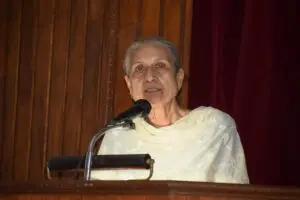Principal's Message
 Dear MHS family,
Dear MHS family,
Greetings of peace and joy to each one of you!
God’s sound decision to give humankind a mind, an intellect, to think, to speak thoughts and then to transform the latter into a story has developed and multiplied from myths and legends, folktales and fairytales, to the theories and treatises on developments in every sphere of life. One such story that is still evolving is the story of education.
Evolutions thus led to revolutions. Revolutions in science and technology have successfully taken place, from the power and use of steam to the benefits of electricity, to the amazing use of electronics and the Internet, and finally, to the wonders of automation and artificial intelligence. Through time, each one has affected and will continue to affect education, careers, employment, and the progress and development of individual societies and countries.
Children born in the twenty-first century are better evolved. They are adept at technology, upwardly mobile, have a wide avenue for honing learning skills and a wider range of career choices. But this evolution has also brought with it a kind of personal backwardness, because these young ones are totally self-immersed and unable to manage their time and resources, have skewed value systems and suffer terrible emotional imbalances, with the failure to understand their culture and the realities of life in their own geographical spheres.
This is an age of information and vast understanding of the world and its diversities. Children in our schools want to spend time in a tinkering shed, on the games’ courts, to think outside the box, to criticise, to create, to form unified groups and to form effective solutions. To some extent technology has made it possible for them to harness, analyse, evaluate and signify their efforts. Therefore, parents and teachers must be prepared to create curiosity, to nurture and sustain it through motivation, guidance and adjacent learning. This will lead to winning challenges through meaningful engagement, understanding the mindset and psyche, and using our intuition to foster creativity to select relevant approaches for helping this generation to evolve into responsible adults.
Students today are knitted together out of different strands of inheritance, environment, country and culture, one that is called a global village. Please understand this and think twice before you flex a tongue to criticise. The school today is doing its best in the balancing act of working with the twenty-first century child within the given framework of national norms, societal expectations and stringent adherence to the affiliated boards. Have patience and hope that our education system will evolve to the new aspirations of one and all.
John F. Kennedy once said, ‘Challenge is the law of life and those who look only to the past or the present are certain to miss the future.’
Long live our MHS, and God bless each one of you!
Y. Cabral
